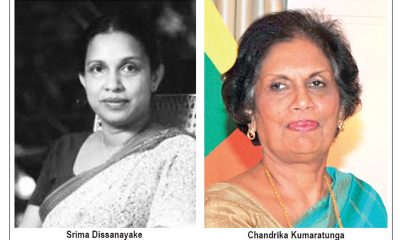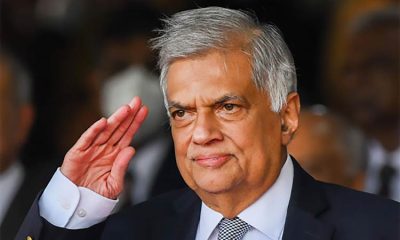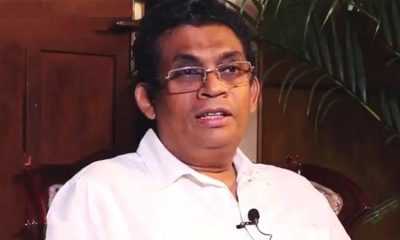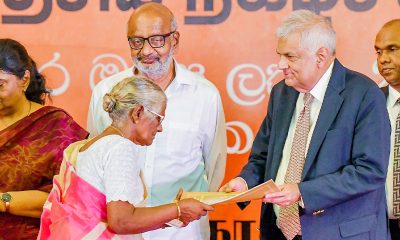Editorial
UNP as a cat’s paw

Monday 18th September, 2023
Some henchmen of the Rajapaksa family, which is responsible for ruining the economy, have taken upon themselves the task of investigating the causes of the country’s bankruptcy! They are all out to absolve their political masters of wrongdoing in a bid to shore up the latter’s chances of winning future elections. Interestingly, their efforts have received a fillip from the UNP, of all parties. UNP Chairman Wajira Abeywardena, MP, has claimed that the declaration of the country’s bankruptcy was baseless, arbitrary, and conspiratorial. His stance is at variance with that of his party leader, President Ranil Wickremesinghe.
Sri Lanka became bankrupt last year when its foreign reserves plummeted to USD 25 million, leaving it without forex to pay for even essential imports, especially fuel and medicine. People waited in long queues for days to obtain diesel, petrol, kerosene, cooking gas, milk powder, etc., which were in short supply. Protests erupted countrywide, and some of them turned violent. Besides, daily power cuts, which were extended to 13 hours, crippled industries, causing job losses. The country was left with no alternative but to resort to a soft default, utilise foreign earnings and aid for essential imports, and seek IMF assistance to straighten up the economy. That was the only way it could prevent its rapid slide into anarchy, with irate public taking to the streets. It has benefited tremendously from financial assistance from India.
If the announcement of the debt default had been unauthorised and unwarranted, as MP Abeywardena claims, President Gotabaya Rajapaksa or Prime Minister Mahinda Rajapaksa or the Finance Minister Ali Sabry would have hastened to annul it. Instead, they based their economic recovery strategy thereon. So did Wickremesinghe after securing the presidency.
The UNP Chairman’s argument that the country was in a position to pay back debt at the time of the declaration of its bankruptcy runs counter to President Wickremesinghe’s oft-repeated claim that the country was bankrupt when he took over the reins of government and his attempts to achieve economic recovery are yielding results. About three months ago, President Wickremesinghe was quoted by his media division as having said, at the AGM of the Sri Lanka Institute of Directors (SLID) in Colombo: “I hope that by September Sri Lanka will be able to shed its bankruptcy status. (Emphasis added.)
It may be recalled that Wickremesinghe, after being appointed Prime Minister in 2022, admitted that the country was bankrupt. On 06 July 2022, CNN reported him as having told Parliament, “We are now participating in the negotiations [with the IMF] as a bankrupt country. (Emphasis added.) Therefore, we have to face a more difficult and complicated situation than previous negotiations [with the IMF].” Addressing Parliament on 08 Feb. 2023, President Wickremesinghe said, “If we continue according to this plan, we can rise out of bankruptcy by 2026 …” (Emphasis added.)
Moreover, President Wickremesinghe said, announcing the IMF’s decision to grant Sri Lanka an extended credit facility: “I took over a country that was on fire, A country that was in chaos; a country that seems to be without an iota of hope for the future; a country that had officially declared itself bankrupt. (Emphasis added.) Thus, it is clear that President Wickremesinghe himself has deemed the announcement of the country’s bankruptcy ‘official’, and therefore how can anyone else consider it unauthorised and unwarranted?
It would have been far easier for President Wickremesinghe to declare that the country was not bankrupt and resume debt servicing than to beg for an IMF bailout, if someone had wrongfully declared the country bankrupt. Will MP Abeywardena explain why his boss, Wickremesinghe, has not done so?
The Rajapaksa loyalists in the SLPP parliamentary group are busy cutting the ground from under President Wickremesinghe’s feet. That they do not want him to succeed in his efforts to stabilise the economy and thereby gain political mileage has become evident from SLPP MP Prof. Ranjith Bandara’s recent statement at the SLPP headquarters that all those who claim to have fared well on the economic front will have to face the harsh reality when debt repayment resumes. Reflected in his claim is the desire of the Basil Rajapaksa faction of the SLPP to see President Wickremesinghe’s economic recovery plan go awry. The UNP is unwittingly pulling political chestnuts out of the fire for the Rajapaksas.
Editorial
Cops as whipping boys?

Saturday 20th December, 2025
Disciplinary action has reportedly been taken against several police officers for their alleged failure to conduct a proper investigation into a recent accident caused by NPP MP Asoka Ranwala in Sapugaskanda. This move, we believe, has the trappings of a diversionary tactic. The police would have incurred the wrath of the government if they had conducted a breathalyzer test on Ranwala and produced him before a Judicial Medical Officer immediately after the crash where an infant, his mother and grandmother were injured.
Ranwala was subjected to a blood alcohol test more than 12 hours after the accident, according to media reports. The police would not have dragged their feet of their own volition. They were obviously made to do what they did. The law applies equally only to ordinary people. Will the police top brass explain why no disciplinary action was taken against the police officers who unashamedly sided with a group of JVP members involved in grabbing an office of the Frontline Socialist Party (FSP) in Yakkala in September 2025. After turning a blind eye to that blatant transgression, the police provided security to the JVP members who were forcibly occupying the FSP office. Thankfully, a judicial intervention made them leave the place. The current rulers claim they have not placed themselves above the law, unlike their predecessors. A wag says they have placed the law below them instead!
Having made a mockery of its much-advertised commitment to upholding the rule of law by intervening to prevent Ranwala from undergoing an alcohol test immediately after the aforesaid accident, the government is making attempts at face-saving. Curiously, blood samples obtained from Ranwala have been sent to the Government Analyst for testing! The government seems to have a very low opinion of the intelligence of the public, who voted for it overwhelmingly, expecting a ‘system change’.
It is being argued in some quarters that the disciplinary inquiry against the police officers has been scripted, and the charges against them will be dropped when the issue fizzles out. This argument is not without some merit, but there is a possibility of the government going to the extent of trying to clear its name at the expense of the police officers concerned if push comes to shove.
Successive governments have scapegoated police personnel and other state employees to safeguard their interests, and the incumbent administration is no exception; it has already sought to shift the blame for its failure to mitigate the impact of Cyclone Ditwah to the Meteorological Department, which, it has claimed, did not warn it about the extreme weather events fairly in advance. Opposition Leader Sajith Premadasa told Parliament on Thursday that the government had muzzled some senior officials of the Meteorological Department.
Some leaders of the incumbent government are bound to face legal action for their commissions and omissions when they lose power, and the state officials pandering to their whims and fancies will have to do likewise.
The public officials who are at the beck and call of politicians and carry out illegal orders should realise that they run the risk of being left without anyone to turn to in case they have to face legal action for their transgressions. Their ruthlessly self-seeking political masters will not scruple to sacrifice them.
Editorial
Disaster relief mired in dirty politics

Friday 19th December, 2025
Opposition Leader Sajith Premadasa has accused the government of interfering with the ongoing disaster relief programmes. Speaking in Parliament, on Thursday, he produced what he described as documentary proof to support his claim that disaster victims were required to have their applications for compensation endorsed by the heads of the Prajashakthi committees controlled by the JVP apparatchiks. Several other Opposition MPs have levelled the same allegation against the government in Parliament.
Two trade unions representing the Grama Niladharis have complained of political interference with their work, and even threatened to pull out of the disaster relief programmes unless they are allowed to carry out their duties and functions, free from political pressure.
Sri Lanka United Grama Niladhari Association (SLUGNA) President Nandana Ranasinghe told the media on 08 December that JVP/NPP politicians and their supporters were meddling with the disaster relief programmes at all levels and even obstructing the Grama Niladharis (GNs). He claimed that the political authority had sent letters to the District and Divisional Secretaries, directing them to appoint JVP/NPP members to the state-run welfare centres. SLUGNA Secretary Jagath Chandralal said state officials had been directed to obtain approval from the government members of the Prajashakthi committees for carrying out relief work. A few days later, addressing the media, Convenor of the Sri Lanka Grama Niladhari Association Sumith Kodikara also made a number of similar allegations. He said the NPP politicians were arbitrarily helping their supporters obtain Rs. 25,000 each as compensation. He stressed that only the disaster victims had to be paid compensation, and never had disaster relief programmes been politicised in that manner. These allegations are shocking enough to warrant probes, as we said in a previous comment.
Initially, the government denied the involvement of its Prajashakthi members in the process of selecting disaster relief beneficiaries, but now it allows them to work alongside state officials openly. This is an instance of the arrogance of power, which became the undoing of several previous governments, especially the ones led by the UNP and the SLPP. Minister K. D. Lal Kantha has gone on record as claiming that the Prajashakthi functionaries too should have a say in relief provision!
Funds the government is distributing among disaster victims belong to the state, and therefore no political party must be allowed to influence or control their disbursement. One can argue that it is prima facie unlawful for anyone other than authorised public officials to get involved in the process of distributing state funds as disaster relief. The Opposition should find out whether there is any legal provision for the involvement of the Prajashakthi functionaries in relief distribution or whether they are committing a transgression.
The government is apparently labouring under the mistaken belief that it can use disaster relief to shore up its approval rating as well as electoral prospects in view of the next election––the Provincial Council polls which it is coming under increasing pressure to hold next year. Political interference with disaster relief only exasperates the public beyond measure. A large number of disaster victims have held protests in several areas, claiming that they have been overlooked.
The JVP/NPP, which came to power promising to depoliticise the state institutions and revitalise the public service, should be ashamed of having stooped so low as to politicise the process of providing disaster relief. Politicians have a sense of shame only when they are out of power.
If the JVP/NPP leaders are wise, they will learn from the predicament of the Rajapaksas, who had to pay a heavy price for testing the patience of the public. The latter had to head for the hills with angry people in close pursuit. Now that the people have successfully got rid of a bunch of failed rulers, they may take to the streets again if their patience runs out. The government would do well to follow the established procedures in carrying out disaster relief programmes, without subjugating them to its political agenda and undermining their integrity.
Editorial
Flawed drug regulation endangers lives

Thursday 18th December, 2025
Serious concerns raised by Sri Lankan medical professionals over the quality of some batches of the Ondansetron injection, manufactured by Maan Pharmaceuticals, Ltd., India, and the subsequent withdrawal of them from hospitals here, have shed light on a bigger issue. The use of nine other parenteral products has been suspended with immediate effect, according to media reports. They will be subjected to quality assessment, the National Medicines Regulatory Authority (NMRA) has said.
Spokesman for the Government Medical Officers Association (GMOA) Dr. Chamil Wijesinghe has stressed the need for thorough tests on Ondansetron. He has told the media that the NMRA is responsible for testing imported pharmaceuticals for quality. However, Health Minister Dr. Nalinda Jayatissa has told the media during the weekly post-Cabinet media that not all drugs imported by Sri Lanka are tested by the NMRA for quality, as it lacks laboratory facilities to do so, and drugs are tested rigorously only if there are complaints of adverse reactions. Is it that the NMRA goes by what pharmaceutical companies say about their products when it approves medicines? The present-day politicians and the health panjandrums have not learnt from the procurement of fake cancer drugs during the previous regime.
Minister Dr. Jayatissa has sought to give the drug controversy a political twist. He has said Ondansetron manufactured by Maan was approved for five years, in 2022, the implication being that the previous government was responsible for the registration of the drug. He hastened to add that proper procedures had been followed in procuring it. Interestingly, among the four batches of Ondansetron found to be contaminated, two were imported under the current dispensation! The NPP government has passed laws to deprive the former Presidents of their retirement entitlements and evict them from their official residences, and it came to power, promising to renegotiate the IMF agreement. So, cancelling the registration of any drug that does not meet stipulated standards should be child’s play for the powerful NPP administration.
On the question of quality issues concerning Indian drugs, it is worth recalling that in the late 1980s, the JVP assassinated Chairperson of the State Pharmaceutical Corporation Dr. (Mrs) Gladys Jayewardene for importing drugs from India, which the JVP likened to a giant octopus spreading its tentacles over Sri Lanka. About three and a half decades on, the JVP-led NPP government has gone to the extent of recognising the Indian Pharmacopoeia amidst protests from Sri Lankan medical professionals!
Dr. Chamal Sanjeewa, who leads the Doctors’ Trade Union Alliance for Medical Civil Rights, has said more than 100 batches of medicines imported from India have been withdrawn during the past two years or so due to concerns about their quality. Flaying the Health Ministry, the NMRA, and State Pharmaceutical Corporation for serious flaws in drug regulation, he has called for the resignation of the top officials responsible for ensuring the quality of imported medicines. Health Minister Dr. Jayatissa should also resign as he has retained the officials responsible for the registration of substandard and falsified drugs in the past, Dr. Sanjeewa has said. The most serious issue, in our book, is that the NMRA is without adequate laboratory facilities to conduct stringent quality tests on all medicines it approves, and apparently takes leaps of faith, leaving patients at risk. Successive governments have paid lip service to the need for state-of-the-art labs to test medicines and ensure that they meet international standards. The NMRA must be fully equipped to test all drugs properly before they are approved, and no room must be left for the import of substandard and falsified medicines.
According to the World Health Organization (WHO), at least one in 10 medical products in low-and middle-income countries fails to meet quality standards or is falsified. This shows the enormity of the problem of falsified and substandard drugs. Quality failures of pharmaceuticals not only harm patients directly but also impose large economic burdens on individuals and health systems, including wasted resources on ineffective treatments and costs related to managing adverse effects, WHO has pointed out. The need for a thorough investigation to find out why the NMRA approved the aforesaid drugs cannot be overstated.
-

 Midweek Review3 days ago
Midweek Review3 days agoHow massive Akuregoda defence complex was built with proceeds from sale of Galle Face land to Shangri-La
-

 Features6 days ago
Features6 days agoWhy Sri Lanka Still Has No Doppler Radar – and Who Should Be Held Accountable
-

 News2 days ago
News2 days agoPakistan hands over 200 tonnes of humanitarian aid to Lanka
-

 News2 days ago
News2 days agoPope fires broadside: ‘The Holy See won’t be a silent bystander to the grave disparities, injustices, and fundamental human rights violations’
-

 Latest News6 days ago
Latest News6 days agoLandslide early warnings in force in the Districts of Badulla, Kandy, Kegalle, Kurunegala, Matale, Nuwara Eliya and Ratnapura
-

 News3 days ago
News3 days agoBurnt elephant dies after delayed rescue; activists demand arrests
-

 Features6 days ago
Features6 days agoSrima Dissanayake runs for president and I get sidelined in the UNP
-

 Editorial6 days ago
Editorial6 days agoDisaster relief and shocking allegations
























